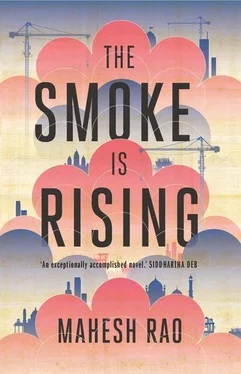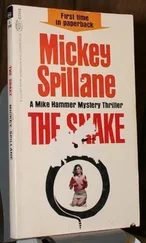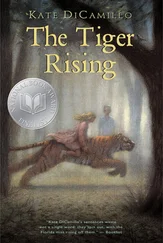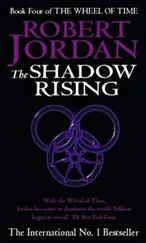A few weeks after the raid, the hotel was open for business again. The Sangam Continental Lodge was categorically not a brothel. The new management was either unwilling to shoulder the risks involved in such an enterprise or firmly resolved against the idea on moral grounds. But in death the Apsara succeeded in leaving more than a trace of her distinctive personality on her successor. Currents of wretched desperation continued to drift up the foul staircase and a profound contamination seeped through keyholes and air vents. The hotel guests shuffled past the reception desk in a hurry, seeking only the solace of a closed door. By day the reception desk was staffed by a threadbare woman with a hacking cough; by night a bearded goon sat in the doorway on a wooden crate that tried gamely to contain his colossal rump. Two straight-backed chairs with elaborately carved headrests stood at the bottom of the stairs but no one had ever been spotted sitting there. The kitchen was no longer operational, even as a conduit to a hidden cellar. In the rooms upstairs, a wan intimacy routed alienation for an hour or two before the space had to be vacated and the key returned.
Shankar closed the door of Room 7 on the first floor and walked downstairs. On the landing he nearly ran into a boy who was making a delivery, his arms clasped around six bottles of beer.
‘Watch where you’re going, sir,’ he said, practised and professional. A large patch covered the seat of his baggy shorts.
Shankar continued down the stairs. As he passed the reception desk, the woman called out to him.
‘Mister, the key,’ she rasped.
‘The lady’s still in the room. She has the key.’
‘What time is she coming down?’
‘Just now. Five minutes.’
The woman returned to the prayer book on her lap and Shankar escaped into the street.
Inside Room 7, Uma sat on the corner of the bed. In her hand she held the key, which was attached to a playing card with a hole punched through it: the seven of clubs. The key smelt like the counter at the medical shop, a combination of hot metal and floor cleaner. She turned to pull the sheet straight and then smoothed out the creases on the two thin pillows. There was no window, no picture, no calendar, nothing to look at in the room apart from the fluorescent light’s icy glare. A jasmine bud had broken free of her hair and lay on the sheet. She picked it up and ran its pursed nib along her cheek before flicking it into the air.
She skirted around the bed and sat down on Shankar’s side, picking at a dog-eared corner of the playing card with the side of her thumb. Someone pulled the chain in the toilet at the end of the corridor and a reluctant gargle made its way through the walls, over her head and down towards the belly of the building.
She guessed that it must be at least ten minutes since Shankar left. She had given him a present for the baby, a bib dotted with a collection of planets. The small square of brown paper lay on his side of the bed: he had either forgotten to take it or had chosen to leave it behind. She stood up and slid the present under one of the pillows. Switching off the light, she opened the door and walked towards the staircase, the key warm in her hand.

The court’s decision was handed down in the course of a short hearing. The judgment was unambiguous. There was no doubt that the ‘public purpose’ test required by the legislation had been clearly satisfied in this case. HeritageLand would provide vast economic benefits, employment opportunities and, with the expected surge in international tourism to Mysore, boost foreign exchange reserves. There could be no clearer formulation of a sound public purpose. It would be inequitable for the court to reject this purpose simply because the conduit for its delivery was private industry. The court was called upon to conduct a delicate balancing exercise and in such cases it was always important to consider the nature of the matter in the round.
Furthermore, the court did not agree with the petitioners’ contention that the public benefits brought by the theme park failed to make restitution for the gross inequity of depriving thousands of farmers of their livelihood and the communities in which many had lived for generations. The government had clearly demonstrated that huge developmental gains would be made and the advancement was for all to share. Farmers who owned land were being compensated for the loss of their property and they would have an undeniable stake in the progress of the city and its environs. The government had guaranteed that landless labourers in the area would also benefit from the fruits of the development.
The court further held that the evidence proffered by the petitioners did not decisively support their assertions that compensation had been miscalculated. There was no obvious unfairness. There was evidence to suggest that elements of irregularity had crept into some of the reports submitted by the state’s land surveyors and in the provision of notices. This was not, however, a sufficiently egregious violation to warrant the court declaring the entire undertaking perverse, irrational, illegitimate, disproportionate or unlawful for any other reason. The parties were urged to come together to iron out these small differences in the spirit of economic cooperation and national betterment.

The lawyer present at the hearing took Vasu to one side. He was sorry to have kept the group waiting but he had needed some time to look through the judgment. It was a completely unanticipated decision. While they had not expected to prevail on every point raised, the exhaustive rejection of their case was mystifying. But matters could not be allowed to end here. The lawyer and the rest of his team would carefully examine the court’s formulations and work out a strategy. Of course, they could not lose hope. There was the Supreme Court. It would take time, effort and money to get there, but it would be worth it in the end. It was precisely for this type of case that the Supreme Court existed.
The lawyer understood that the community would be gravely disappointed. He would come now and explain the decision to those present and, if necessary, would visit one or two of the villages in the next few days. They had to have faith in the legal system. It would be difficult but they would have to be determined and perseverant. They would obtain a stay order on any attempts at encroachment or construction on the land. They would approach the court as many times as was required. If any government or private contractors attempted to defy the orders, they would move the courts again. In the case of harassment or intimidation, the police would be able to assist them. Besides, such conduct would work against their opponents when it fell to judicial scrutiny at the next stage. The lawyer was aware that there had already been reports of the involvement of the Mysore land mafia in certain areas. The important thing was to bring all such incidents to the attention of the relevant authorities.
He could not say how long it might take for an appeal to be heard. He knew that Vasu had witnessed the delays in getting the case to the High Court and so had experience of the complexity of these matters. But the important thing was to emphasise to the community that the fight was not over. They just had to be patient.

Читать дальше













